
A consul is an official representative of a government who resides in a foreign country to assist and protect citizens of the consul's country, and to promote and facilitate commercial and diplomatic relations between the two countries.

Under the Basic Law, Macau's diplomatic relations and defence are the responsibility of the central government of China. Except diplomatic relations and defence, nonetheless, Macau has retained considerable autonomy in all aspects, including economic and commercial relations, customs control.

There are 123 diplomatic missions in Hong Kong, of which 62 are consulates-general and 61 are consulates and six officially recognised bodies in Hong Kong. As Hong Kong has the status of a Special Administrative Region of the People's Republic of China, some consuls-general in Hong Kong report directly to their respective foreign ministries, rather than to their Embassies in Beijing.

Poland–Ukraine relations revived on an international basis soon after Ukraine gained independence from the Soviet Union in 1991. Various controversies from the shared history of the two countries' peoples occasionally resurface in Polish–Ukrainian relations, but they tend not to have a major influence on the bilateral relations of Poland and Ukraine.

Bulgaria–Canada relations are the Interstate relations between Bulgaria and Canada that were established in 1966.

Diplomatic relations between Australia and Ukraine were established in 1992. Ukraine has had an embassy in Canberra since March 2003 and the Australian Embassy in Kyiv was established in December 2014, however, Australia closed its embassy in Kyiv in February 2022 due to the 2022 Russian invasion of Ukraine.

Karta Polaka, literally meaning Pole's Card, but also translated as Polish Charter or Polish Card, is a document confirming belonging to the Polish nation, which may be given to individuals who cannot obtain dual citizenship in their own countries while belonging to the Polish nation according to conditions defined by law; and, who do not have prior Polish citizenship or permission to reside in Poland. It was established by an act of the Polish parliament dated 7 September 2007 called the Act on the Pole's Card, which specifies the rights of the holder of the Card, the rules for granting, loss of validity and rescission of the Card, and the competencies of the public administration's bodies and procedures in these cases. The law came into force on 29 March 2008.

Foreign relations exist between Australia and Estonia. Australia first recognised Estonia on 22 September 1921. Australia was among the first countries to re-recognise Estonia's independence on 27 August 1991. Both countries re-established diplomatic relations on 21 November 1991.
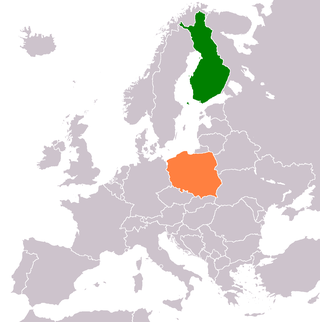
Finland–Poland relations refer to bilateral relations of Finland and Poland. Both countries are members of the European Union, NATO, OECD, OSCE, Council of the Baltic Sea States, HELCOM, Council of Europe and the World Trade Organization. Both countries established diplomatic relations on 8 March 1919.
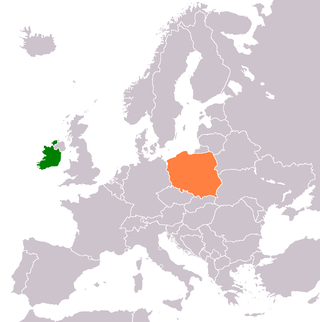
Ireland is home to a Polish community totaling approximately 150,000 people. The Polish language is the most spoken foreign language in Ireland. Both nations are members of the Council of Europe, European Union, OECD and OSCE.
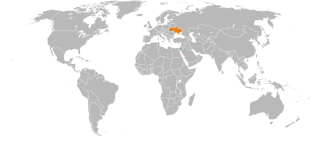
Israel–Ukraine relations are foreign relations between Israel and Ukraine. Both countries recognized each other de facto on 11 May 1949 as the Ukrainian SSR and established de jure diplomatic relations on 26 December 1991 as an independent state. Israel has an embassy in Kyiv. Ukraine has an embassy in Tel Aviv and a consulate-general in Haifa. With more than 500,000 Ukrainians settled in Israel, they form the largest foreign community in the country. Ukraine has one of the largest Jewish communities in Europe; estimates of its size vary greatly, ranging from 70,000 to 400,000.

The Embassy of the Philippines in Warsaw is the diplomatic mission of the Republic of the Philippines to the Republic of Poland. It is located on ul. Stanisława Lentza 11 in the Wilanów district of south Warsaw, near the Wilanów Palace. Although the current embassy dates from 2009, the Philippines also maintained a previous resident embassy in Poland in the early 1990s.
Oleg Vyshniakov is a Ukrainian businessman and a public figure, in office since November 2014 as the Ukrainian Honorary Consul of the State of Israel in the city of Lviv in the Western Ukraine.
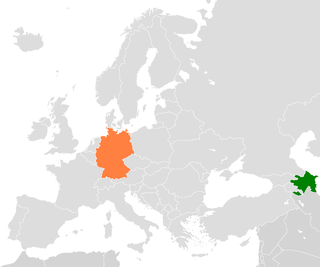
The diplomatic relations between Azerbaijan and Germany established in 1992 after Germany recognized the independence of Azerbaijan.
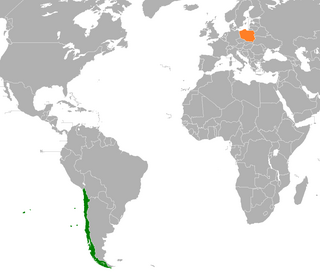
Chile and Poland maintain diplomatic relations. Both nations are members of the OECD.

Marshall Islands–Spain relations are the bilateral and diplomatic relations between these two countries. The Spanish embassy in Manila, Philippines, is accredited for the Marshall Islands, plus Spain has an honorary consulate in Majuro. The Marshall Islands have an embassy in Madrid and a consulate in Barcelona.

Ukraine–Andorra relations – a set of international bilateral relations between Ukraine and the Principality of Andorra, as well as cooperation between the two countries in international organizations and other international institutions. Ukraine's interests in Andorra are represented by the Embassy in Madrid (Spain) and an honorary consulate in Andorra.

Foreign relations exist between Australia and Latvia. Australia first recognised Latvia on 22 September 1921 and was among the first countries to re-recognise Latvia's independence on 27 August 1991. Both countries re-established diplomatic relations on 21 November 1991. Australia is represented in Latvia through its embassy in Stockholm, Sweden and an honorary consulate in Riga. Latvia has had an embassy in Canberra since October 2021, and also has honorary consulates in Sydney, Brisbane, Adelaide, Melbourne and Perth.



















